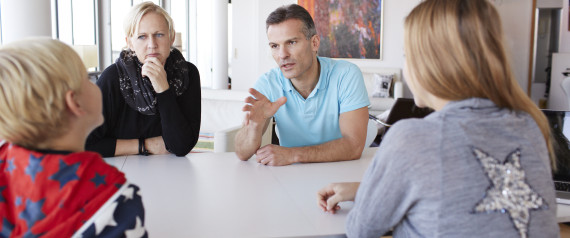One of the most difficult challenges confronting a parent is how to help children understand and cope with the divorce and resume their normal course of growth. This is a difficult task because, at the same time, parental resources are being stretched to the limit. It is also difficult because parents often lack information and appropriate role models for how to parent the children during and after the divorce.
Most separating parents are filled with worries about their children. Because of these concerns, parents want to know how to help their children “survive the breakup” and emerge as reasonably healthy, well‑adjusted adults.
Telling the Children
Parents often find telling the children about the separation or divorce a particularly difficult experience. Some parents find their own emotions coming to the surface as they think about sharing the decision to divorce with their children. Other parents feel unsure about what is appropriate to tell their children and how to tell them. Children need information about the changes which will be occurring in their lives. It is best if parents are together when they tell the children.
What Children Need to Hear:
- You will continue to take care of and provide for them.
- While your feelings for each other as husband and wife have changed, the special relationship between parent and child goes on forever.
- Dad and Mom won’t be married anymore, but the child’s relationship with parents, siblings, grandparents and other relatives will continue.
- The children did not cause the divorce.
- Children often wish parents would get back together, but that is not going to happen.
- The divorce or separation was not an easy decision. After a lot of effort to make the marriage work, you decided you could no longer live together.
- When you married, you loved each other and hoped things would work out.
- You are sorry for the hurt this decision is causing your child.
Tell the children as specifically as possible how they will live (where, with whom, when they will see each parent), plans for school, extra‑curricular activities, continued friendships and how and where each parent will live.
What Children Don’t Need to Hear:
- Blame cast upon the other parent for the divorce. Don’t give children the message that one parent is the “good guy” and one the ‘bad guy’, even if you feel that way.
- Details of what went wrong in the marital relationship (i.e. affairs, money problems, personality problems, etc.). Children don’t need this information and are burdened by it.
- Negative statements about the other parent. While you may have negative feelings about the other person, expressing them to the children puts children in emotional conflict.
Talking with the children is a process over time, not a one‑time event. There will be many opportunities. Children may respond immediately with questions, or the questions may come later. Children may not express their feelings at the moment, but emotional and behavioral changes, as well as questions, are to be expected over time. These emotional responses will vary, e.g. crying, silently withdrawing, temper tantrums. Talking with the children about family changes opens up communication and lets them know that their parents are willing to talk and to be available to them. Letting the children know that both parents want to hear their feelings and questions will reassure them that sharing their feelings will not cause distress to a parent.
What Parents Can Do To Help
- Give nurturance and affection.
- Provide verbal reassurance.
- Both Mom and Dad saying “I love you.”
- Maintain consistency of people and routines.
- Reassure the child that he/she will be cared for.
- Provide clear and concrete explanations of changes.
- Provide opportunity for child to express feelings and fears through words and play.
- Avoid angry expressions and emotional outbursts in front of child.
- Don’t fight in front of child.
